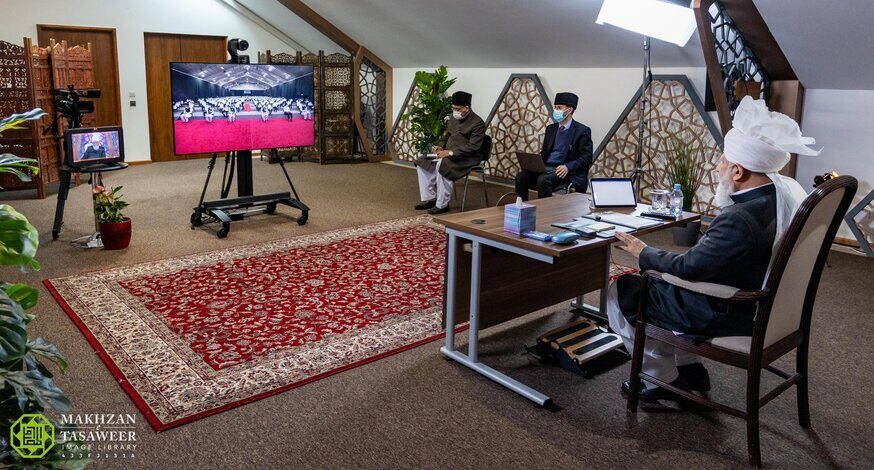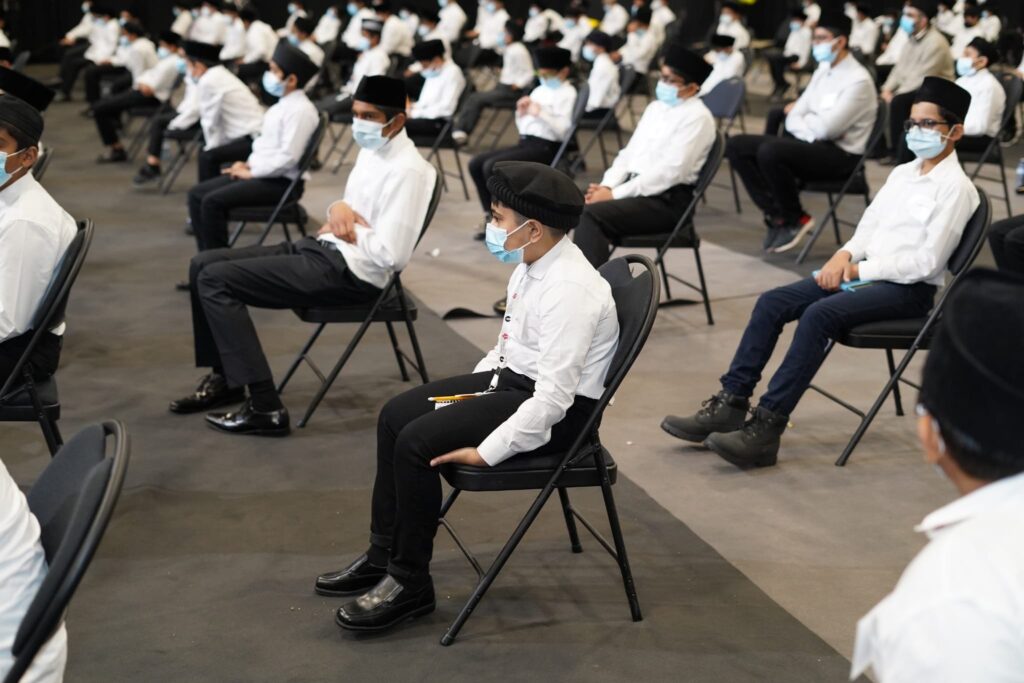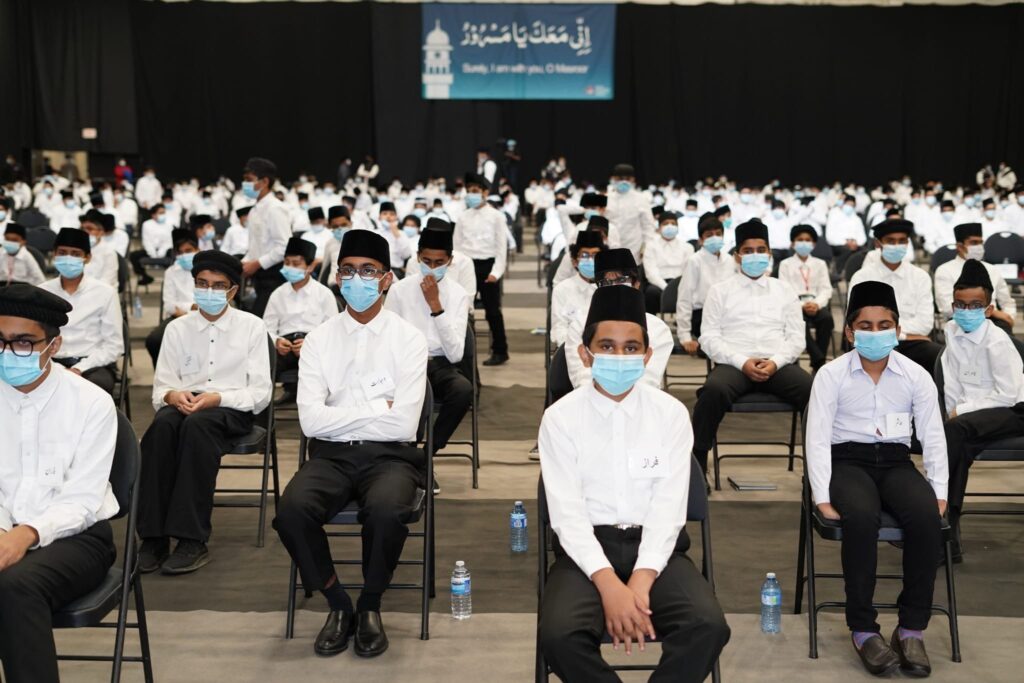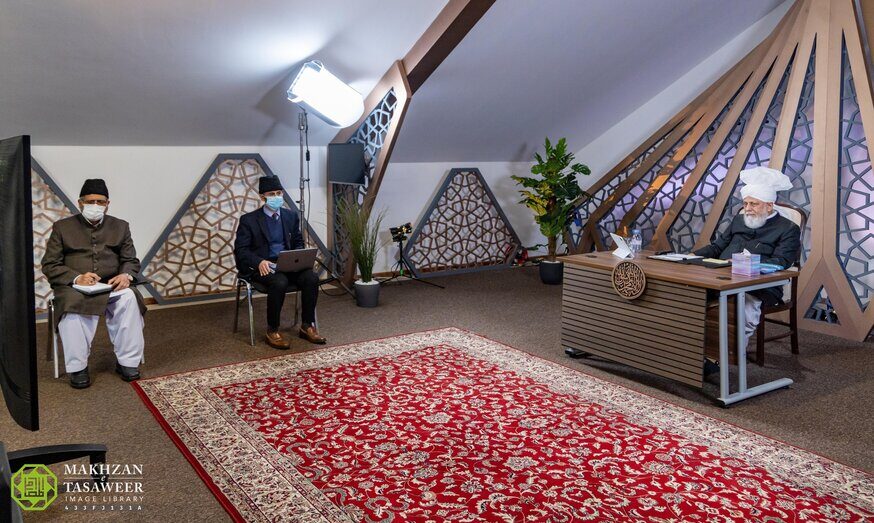
On 17 October 2021, 550 waqifeen-e-nau members of Atfal-ul-Ahmadiyya Canada were given the opportunity to meet with Hazrat Khalifatul Masih Vaa in a virtual meeting.
The mulaqat commenced with a recitation from the Holy Quran by Saagar Sahib. Next, Darman Sahib presented the English translation thereof. Then, Qaiser Sahib recited a poem composed by Hazrat Musleh-e-Maudra, in which Huzoorra addressed members of the Jamaat and stated that he would never expect for his loved ones that they remain satisfied with a lower status and set small goals for themselves. Haris Sahib then read out the translation of the poem.
Jazib Sahib had the opportunity to present a hadith of the Holy Prophet, Muhammadsa followed by its English translation by Intisar Sahib. Nuruddin Sahib then read out an extract of the Promised Messiahas in which Hazrat Ahmadas stated that the valuable and worthy in the sight of God was the one who was a servant of faith and beneficial to mankind. Rayan Sahib then presented the English translation of the extract.
Hazrat Khalifatul Masih Vaa then turned to Sadr Majlis Khuudam-ul-Ahmadiyya Canada, Zubair Afzal Sahib, and asked him what the programme was. Sadr Sahib replied that there were some atfal who had questions they wished to ask Huzooraa and seek guidance on.
The first question was asked by Zayan Sahib. He asked Hazrat Khalifatul Masih Vaa how one could develop kindness in one’s heart like the Holy Prophetsa.
Addressing the young tifl, Huzooraa smiled and asked, “You don’t have any kindness in your heart?” Huzooraa then asked him if he was the eldest among his siblings; to which he responded in the affirmative.
Hazrat Khalifatul Masih Vaa then said:
“Do you feel any love or sympathy for them in your heart?” Zayan Sahib replied in the affirmative. Huzooraa said, “In the same way, you should have the same feeling for others. Whatever action the Holy Prophetsa used to take, or anything he did, was for the sake of Allah. He had the love of Allah. So, you should develop the love of Allah in your heart. And when you develop the love of Allah in your heart, then you will develop the love of Allah’s creation in your heart. And also [you should] develop love for the Holy Prophetsa who taught us how to develop the love of Allah, and for this, you must read the life history of the Holy Prophetsa. In this way, you will create and develop love for the Holy Prophetsa in your heart, and consequently you will develop the love for human beings and your fellow beings.”
Sheheryar Sahib stated that as a new high school student, he noticed some evils and vices that occurred in school. He asked Huzooraa for advice on how one could refrain from such vices commonly found in school.
Hazrat Amirul Momineenaa said:
“So, now you are almost 15? And this is a very dangerous age – teenage years normally are – and when one reaches the age of 15, 16, 17, one thinks that he is now mature and thinks there should be no restriction on him; but keep in mind that you are an Ahmadi, and you believe in one God, and believe that Islam is the true religion. We believe that the Holy Quran is the last book of the Shariah which was revealed to the Holy Prophetsa. So, there are quite a number of commandments [and] injunctions, in that book [the Holy Quran]. Allah Almighty has explained to us that these are the bad things, and these are the good things. So, if we know what is bad and what is good, then obviously, if you are a sane person; if you have some wisdom, then you will try to avoid those things which are bad which can ultimately destroy your life here in this world and in the Hereafter […] So, if you fear Allah the Almighty, you will avoid all these things….”
Hazrat Amirul Momineenaa explained that one should always remember that Allah was watching our every action. And, thus, to achieve the love of Allah, we should obey his commandments. In this way, one would be able to avoid the bad things prevalent in society.
Huzooraa added, “[…] your fellow students, if they are doing something wrong, then you should try to express your dislike on that thing; or rather, you should hate that thing if they are doing something bad […] choose your friends from among those students who are good in nature, good in studies, and morally good.”

Touheed Sahib asked how many hours one could fast if one was under 10 years of age.
Hazrat Amirul Momineenaa answered:
“During the summer, the days are very long and sometimes [the fast] can be 18-19 hours. So, you [as a child] cannot fast for such a long time […] if you are quite young, and if you wish to fast, then do it during winter days, or during those days which are not very long”.
Huzooraa explained that children shouldn’t try to overburden themselves. A young child who was 10 years of age was developing and still growing. Huzooraa added that the “fast is not obligatory on young children.”
Hazrat Amirul Momineenaa said that if a child wished to eat sehri in the morning, he may do so. He could also wake up early and offer the Tahajud prayer and Fajr prayer too.
Next, Zuhaib Sahib asked what the best way was for one to establish a connection with Huzooraa, so much so that Huzooraa knew who he was.
Huzooraa said:
“You should write to me frequently. And sometimes you can write to me some good joke, some good narration so then I will remember that he is the boy who wrote such and such thing. If you like, you can paste your picture as well on your letter.”
Attar Sahib asked how he could offer Salat in school as he wished to offer the prayers on time.
Hazrat Khalifatul Masih Vaa answered that one could ask one’s teacher to provide and permit some time to offer prayer. Huzooraa further said, “As far as Jumuah is concerned, if possible, you should take leave on Friday for one or two hours if your mosque is near the school; or if your house is near your school, you can come home and offer your Jumuah prayer”.

Tauseef Sahib asked Huzooraa if there could be an MTA channel for children with kids programmes and stories about the Holy Prophetsa and the Promised Messiahas.
Answering this, Hazrat Khalifatul Masih Vaa said that nowadays, there was a slot given for such shows for children. “Even now,” Huzooraa said, “they have started a new programme of my khutbahs, for children, in which they try to explain my khutbah in an easy language and in different ways which is understandable for children. At present, we have slots [allocated for such programmes] for children, but a time will come when we shall have an MTA [channel for] children; a dedicated channel for you. Later on, but not now. It is possible; we shall see to it”.
Next, Huzooraa was asked, by Kashif Sahib how to remain focused in Salat. Hazrat Khalifatul Masih Vaa answered:
“When you are offering Namaz, when you recite Surah al-Fatihah, you should recite:
اِهۡدِنَا الصِّرَاطَ الۡمُسۡتَقِيۡمَ
And you should know the meaning of it”. Hazrat Amirul Momineenaa explained that it was important to know the meaning of Surah al-Fatihah and Salat.
Huzooraa said that he would have to keep trying to focus on Salat and repeatedly recite اِهۡدِنَا الصِّرَاطَ الۡمُسۡتَقِيۡمَ and one day he would achieve focus in Salat.
Danial Sahib asked Hazrat Amirul Momineenaa how much time a waqif-e-nau should spend watching TV and playing games.
Huzooraa said:
“As a waqif-e-nau or as an Ahmadi child, you should spend no more than one hour watching TV – that [one hour] is enough for you. And then, at least one hour to one-and-a-half hour, you should play outside; not games on your television […] go outside in the field, play soccer or some other game, and also read some books”.
Huzooraa explained that there were quite a number of books prepared by the Jamaat about Companionsra of the Holy Prophetsa. Children should read such books to increase their knowledge.
Huzooraa explained, “It is better to go outside and play, instead of watching TV. That is good for your health and your brain development.”
Next, Hizqeel Sahib said to Huzooraa that, sometimes, bad thoughts assailed his mind. He asked Huzooraa how he could ignore these evil thoughts.
Hazrat Amirul Momineenaa explained that one, in such circumstances where bad thoughts arose, should repeatedly engage in istighfar. “Pray to Allah Almighty in your prayer that He may save you from satanic attacks”.
Huzooraa said that whenever such thoughts occurred, one should read good books and one should address and encourage oneself to stay away from bad things and thought.
Suleman Sahib asked Hazrat Amirul Momineenaa what the difference was between Satan and Iblis.
“Satan and Iblis,” Huzooraa explained, “are two names of one being”. When a thought came into one’s mind to disobey the commandments of Allah Almighty, it meant that Iblis was trying to incite him.
Hazrat Amirul Momineenaa further added that Satan and Iblis were “two different characters of one being […] When you refuse to obey the commandments of Allah Almighty, it means Iblis is asking you to do it. And [when] something wrong comes into your mind, and you commit that wrong deed, then that is Satan who has incited you to it.”

Rana Nauman Sahib asked Huzooraa how he could explain and prove to his friends the existence of God.
Huzooraa asked him if he believed in God and if God had ever accepted his prayers; to which the young tifl replied in the affirmative. Huzooraa then said:
“Then you can tell [your friends], ‘God does exist, and I have first-hand experience. I was in need of something, I prayed to Allah Almighty, and He accepted my prayer. And that was not by chance, and this proves that He does exist’ […] You can also tell them Who created this world. For every creation, there should be some creator”.
Labeeq Sahib asked if it was permissible to eat at a friend’s house who was a non-Muslim. Answering, Huzooraa said:
“You can eat at your friend’s house; there is no problem in that. But make sure that whatever you are eating is free of alcohol and pork.”
Next, Azfar Sahib asked what one should do to become the best waqif-e-nau. Hazrat Amirul Momineenaa said that five years ago, he delivered a sermon on this topic in which he explained the attributes of a good waqif-e-nau. Hazrat Amirul Momineenaa said, “I mentioned 30 or some qualities [of a true waqif-e-nau] in my khutbah. You should read that khutbah again and try to act upon those things”.
Hazrat Khalifatul Masih Vaa said that a good waqif-e-nau should be regular in offering the five daily prayers, regular in reciting the Holy Quran daily and try to understand the text of the Holy Quran and know its translation. A waqif-e-nau should be well-behaved.
Rawaha Sahib asked Huzooraa that if Allah knew our future, why we had to pray for things.
Huzooraa answered:
“Allah knows your future, you don’t know. Do you know?
“Allah knows what you will ask for in the future. If you ask for that thing and it is good for you, Allah Almighty will give it to you. If you don’t ask the thing and don’t pray to Allah Almighty for that, then Allah Almighty will not give you. Allah knows [your future] but it is not necessary that because Allah knows it, He will definitely give it to you. Allah knows that ‘if this boy asks Me something and prays to Me, then I will give it to him.’ Allah did not say that if you pray to Him or not, He will definitely give”.
Next, Labeeb Sahib asked Hazrat Khalifatul Masih Vaa if the Jamaat had any plan, in the future or being worked on in the present, to help children who required special care and attention due to medical conditions.
Huzooraa replied:
“Here in Canada, we don’t have that many resources, but a time will come; that is the plan. But in Rabwah, for instance, we have an institute for children with special needs, and that school is working very nicely. Here, in Canada also, a time will come when we shall have the resources, we shall open some school for special needs children”.
As the mulaqat came to a close, Hazrat Khalifatul Masih Vaa said that those who did not get the opportunity to ask a question could write their questions to him.
Huzooraa then conveyed his salaam and the meeting drew to a close.
(Report prepared by Al Hakam)


Assalamo Aleikum, Al Hakam team doing so good Job,! JazakAllah, so I could read all the details.